牛津英语模块6 Unit1语法
上海版牛津英语6AUnit1Family and relatives 单词词组语法和练习题
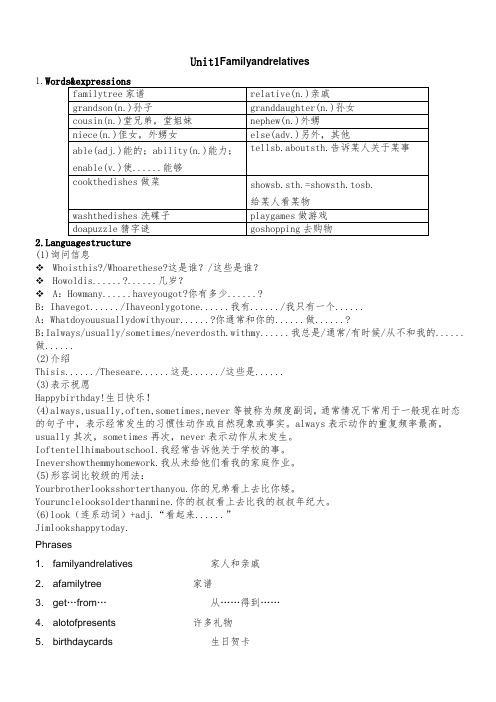
Unit1Familyandrelatives1.(1)❖❖❖AB:A:B:......做(2)(3)(5)(6)look(连系动词)+adj.“看起来......”Jimlookshappytoday.Phrases1. familyandrelatives 家人和亲戚2. afamilytree 家谱3. get…from…从……得到……4. alotofpresents 许多礼物5. birthdaycards 生日贺卡6. happybirthday 生日快乐7. makeabirthdaycardforme. 为我做一张生日贺卡8. oneofyourfamilymembers 你的家庭成员之一9. talkabout 谈论10. goshopping 去购物11. goswimming 去游泳12. gocycling 去骑车5.Let saysomethingabout toyoufirst.(I)6.Iliketogo (shop)withmumandshealwaysbuyssomethingforme.7.Sheisalways (friend)tootherpeople.8.TheSmithsaregoingtovisit (they)friendsinAmerica.9.Therearetwelve (member)inmyfamily.10.Iusuallygototheparkwith (I)parents.11. (this)aremyfamilyphotos,canyoufindme?12.Iusuallygo (swim)insummer.13.Howmany (classmate)arethereinyourclass?14.Bytheway,whatelsedoyoudowith (they)?15.Thisis (Tom)classmate.II.Choosetherightwordsorexpressionstocompletethesentences.(选择适当的单词或短语完成句子)1.I gotoschoolat7:30.10.Weusewatertowashclothes,we (both,also)usewatertocookfoodandmakedrinks.11.SamisAlice’suncle.SoAliceisSam’s (nephew,niece).12. (These,This)aremycousins.IV.Choosethebestanswer.(选择最恰当的答案)()1.Ihavegotalotofbirthdaycards myfamilyandrelatives.A.atB.forC.inD.from()2.Mr.andMrs.Wangaremyparents.Iamtheir .A.sisterB.doctorC.cousinD.daughter()3.–Happybirthdaytoyou!-- .A.ThankyouB.HowareyouC.That’sallrightD.Fine,thankyou()4.Tomsometimes withhisbestfriend,Peter.A.toplaybadmintonB.playsbadmintonC.playingbadmintonD.playbadmintons()5.Theyaremygrandparents.Iam grandson.()()()()()()()()()14. averycoldmorning,theboywasborninapoorfamily.A.InB.OnC.AtD.Under()15.Mygrandfatheris inmyfamily.A.olderB.oldestC.oldD.theoldest ()16.Thisisafriendof .A.theyB.themC.theirsD.their()17. wonderfulpicture!Ilikeitverymuch.A.WhataB.WhatC.HowD.Howa()18.Ihaveonecousin.Shehasonecousin, .A.alsoB.tooC.bothD.either()19.Mariaoftengoesshopping hermother.A.forB.withC.fromD.of()20.What doyouusuallydoonSunday?A.elseB.othersC.anotherD.theother()()()()()()()()()29.Peteralways lunchatschool.Buttomorrowhe athome.A.has;isgoingtohaveB.have;wasgoingtohaveC.has;wasgoingtohaveD.have;isgoingtohave()30.Look!Thesearemy and .A.family;relativeB.family;relativesC.families;relativesD.families;relative ()31.JimandPeterare aboutDanny’sbirthday.A.sayingB.speakingC.talkingD.telling()32.Whatan gameitis!A.exciteB.excitingC.excitedD.excitedly()33.Ienjoyplayingfootballwithmyfatheratweekends.Theunderlinedwordmeans“”.A.wantB.wouldlikeC.likeD.liketo()34.Mygrandfatheralwaystakeawalkafterdinner.Theunderlinedwordmeans“”.A.alreadyB.allthetimeuallyD.sometimes()35.–Thankyouforhelpingme.It’sveryniceofyou.–.14.Mytelephonenumberis.(对划线部分提问)15.Isometimesplaybadmintonwithmyfather.(改为一般疑问句)16.MaryandLucyaremybestfriends.(改为一般疑问句)VI.Choosethewordorexpressionwhichisclosestinmeaningtotheunderlinedpartineachsentences (选择与下列各句中划线部分内容意思接近的单词或短语)1.June28th isAmy’sbirthday.2.Didyouhaveagoodtimeonyoursummerholiday?3.Wouldyoushowmeyourstamps?4.Thepeopleinthatroomaremyauntsanduncles.5.ThissummerholidayLucyisgoingtovisithergrandparentsinChongming. VII.Fillintheblankswiththeverbsintheirproperforms(时态填空)1.Johnnever (do)thecookingathome.2.They (noteat)thetraditionalfoodinChina.3.do,your,you,do,with,youruncle,what,usually。
牛津译林版六年级上册英语全册语法知识点详解(unit1)
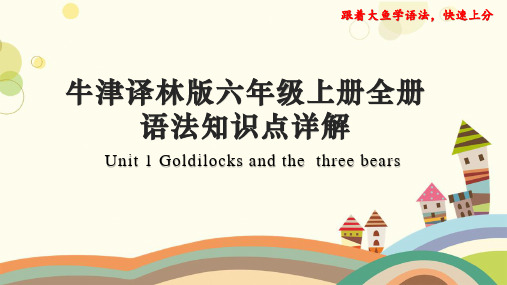
一、一般过去时的用法
(三)过去式变形规则 3. 其他动词。 (4)以“辅元辅”结尾的动词,双写这个辅音字母再加ed。如: stop→stopped、drop→dropped (5)不规则变化。如: go→went、see→saw、bring→brought、catch→caught、 sleep→slept、make→made、p)标志词 6. once(曾经);once upon a time(从前) eg: Once upon a time, the king liked new clothes. 7. last+一段时间(night/week/month/ year等) eg: We went shopping last Saturday. 8. ago(two days ago);long long ago eg: We had a picnic a week ago. 9. One day eg: One day, he got lost in the forest. 10.in +2020年以前的年份。 eg: Lily lived in Beijing in 2016.
二、现在进行时的用法
(四)注意事项 1. 根据主语单复数选用合适的be动词: 单数用is,复数用are 2. 动词ing的规则需牢记: (1)一般在动词后加ing。如:work→working、read→reading (2)以不发音的e结尾的动词,去掉e,再加ing。如:smile→smiling、write→writing。 (3)以重读闭音节结尾的且词尾只有一个辅音字母的,双写这个辅音字母加ing。常见的有: sit→sitting、stop→stopping、run→running、swim→swimming、shop →shopping。
Unit 6 Period 1 Grammar 课内语法精讲-六年级英语上册(牛津上海版)

6. It takes sb. + 时间 + to do sth. 做某事花了某人多少时间 It took me half an hour to go over my lesson. 复习功课花了我半个
小时。 = I spent half an hour on my lesson.
7. a few, some, a lot of a few一些;some一些;a lot of许多 这些都是表示数量的单词或短语。a few用来修饰可数名词,表示肯定,意为“少数的;几 个;一些”。例如: I have a few books. 我有一些书。 some是不定量代词,意为“一些”,既可以修饰可数名词,也能修饰不可数名词,常用于肯 定句,当用在特殊疑问句中时表示渴望得到对方的肯定回答。例如: I'd like to have some milk for breakfast. 早餐我想喝一些牛奶。 -Would you like some water?你想要喝水吗? -No, thank you. 不,谢谢。 a lot of是一个形容词性短语,意为“许多,大量”,修饰可数名词或不可数名词,常用于肯 定句中。例如: There are a lot of trees in this park. 这个公园里有大量的树。 Tom earns a lot of money by hard work. 汤姆通过努力工作挣了许多钱。
Unit6 Going to school
1. be/live near some place 离/住得离某地近 My school is
_______ my home. 我家离学校很近。 I live _______ my
school. 我住得离学校很近。【答案】near
【牛津小学英语六年级】第一单元词汇语法解析
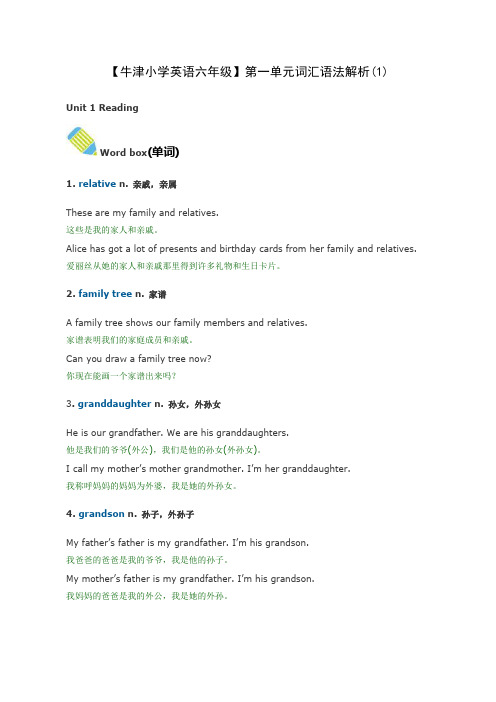
【牛津小学英语六年级】第一单元词汇语法解析(1)Unit 1 ReadingWord box(单词)1. relative n. 亲戚,亲属These are my family and relatives.这些是我的家人和亲戚。
Alice has got a lot of presents and birthday cards from her family and relatives. 爱丽丝从她的家人和亲戚那里得到许多礼物和生日卡片。
2. family tree n. 家谱A family tree shows our family members and relatives.家谱表明我们的家庭成员和亲戚。
Can you draw a family tree now?你现在能画一个家谱出来吗?3. granddaughter n. 孙女,外孙女He is our grandfather. We are his granddaughters.他是我们的爷爷(外公),我们是他的孙女(外孙女)。
I call my mother’s mother grandmother. I’m her granddaughter.我称呼妈妈的妈妈为外婆,我是她的外孙女。
4. grandson n. 孙子,外孙子My father’s father is my grandfather. I’m his grandson.我爸爸的爸爸是我的爷爷,我是他的孙子。
My mother’s father is my grandfather. I’m his grandson.我妈妈的爸爸是我的外公,我是她的外孙。
5. only adv. 仅仅I only have one aunt.我只有一个阿姨。
I only go swimming with my cousin.我只和我的表弟一起去游泳。
6. member n. 成员,会员How many members are there in your family?你家有几口人?Make a birthday card for one of your family members or relatives.为你的一位家庭成员或亲戚制作一张生日卡片。
牛津小学英语六年级Unit1Publicsigns

Unit 1 Public signs单元知识要点:词汇:No smoking, No littering, No parking, No cycling, No eating and drinking, keep off, Don’t touch, keep quiet, make noise, walk on the grass, public signs, only four years old, take a walk, ask some questions, stay away f rom, on the bird’s cage, pick up, ride a bike, take photos, climb the tree, come up, look around, a ten-yuan note句型:What does this/that sign mean? It means ‘Danger’.You shouldn’t make noise/park/eat and drink/...You should keep quiet/keep off the grass.C an I …? No, you can’t. You shouldn’t … now.Can I go in? No, you can’t. You must stay from the building.语法:should表示建议,命令,义务,责任的意思,常译作“应当”或“应该”,否定形式should not (shouldn’t)。
例如:1、建议或命令You should go home now.You should brush your teeth every morning.2、义务或责任You should help your classmates when they are in difficulty.(当你的同学有困难的时候,你应该帮助他们。
高中牛津英语模块6unit1project中英文对照
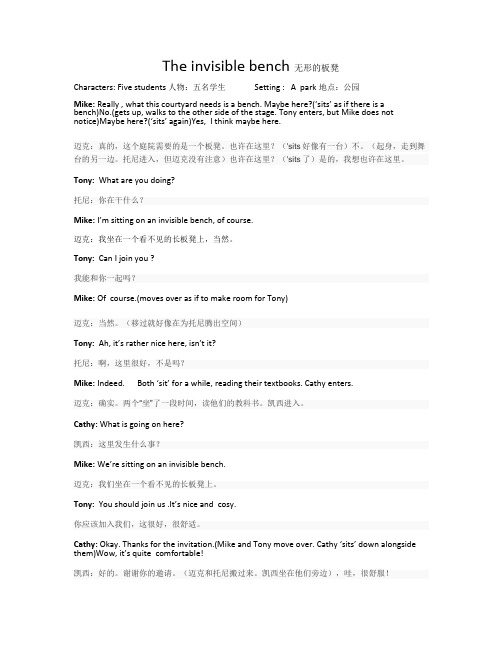
The invisible bench无形的板凳Characters: Five students人物:五名学生Setting : A park地点:公园Mike:Really , what this courtyard needs is a bench. Maybe here?(‘sits’ as if there is a bench)No.(gets up, walks to the other side of the stage. Tony enters, but Mike does not notice)Maybe here?(‘sits’ again)Yes, I think maybe here.迈克:真的,这个庭院需要的是一个板凳。
也许在这里?('sits好像有一台)不。
(起身,走到舞台的另一边。
托尼进入,但迈克没有注意)也许在这里?('sits了)是的,我想也许在这里。
Tony: What are you doing?托尼:你在干什么?Mike:I’m sitting on an invisible bench, of course.迈克:我坐在一个看不见的长板凳上,当然。
Tony: Can I join you ?我能和你一起吗?Mike: Of course.(moves over as if to make room for Tony)迈克:当然。
(移过就好像在为托尼腾出空间)Tony:Ah, it’s rather nice here, isn’t it?托尼:啊,这里很好,不是吗?Mike: Indeed. Both ‘sit’ for a while, reading their textbooks. Cathy enters.迈克:确实。
两个“坐”了一段时间,读他们的教科书。
凯西进入。
Cathy: What is going on here?凯西:这里发生什么事?Mike: We’re sitting on an invisible bench.迈克:我们坐在一个看不见的长板凳上。
牛津英语模块六unit1--unit4知识点

牛津英语模块六unit1--unit4知识点Unit 1 Laughter is good for you (Module 6)【考点释析】 1. response n. 回应,反应;回答 respond vi 回应,反应 (P 2) ▲ make responses to … 对…做出答复 ▲ in response to … 答复…, 对..作出反应 ▲ respond to … with … 用…对…做出反应 I offered to help him, but he didn ’t respond (= he made no response). 我主动给他提供帮助,但他没有回应。
He responded to my advice with a smile. 他对我的建议报以一笑。
. = He smiled in response to my advice. 2. queue up 排队(等候) (P 2) ▲ queue up for 为…而排队等候 ▲ queue up to do 排队做某事 ▲ jump the queue 未轮到而抢先,插队 ▲ a queue of 一长列(车等) Children queued up for tickets. 孩子们排队等候买票。
They ’re queuing up to see a film. 他们排队看电影。
We shouldn ’t jump the queue at any place. 在任何地方我们都不应该插队。
There is a queue of cars at the traffic lights. 交通灯前有一长列汽车。
3. award vt. 奖励,授予; n. [C] 奖品,奖状,奖金 (P 2) ▲award sb. sth. / sth. to sb. 把某物颁发给某人 A prize was awarded to her for her contributions. 她因作出贡献而获奖。
深圳牛津英语 一至六年级语法汇总表
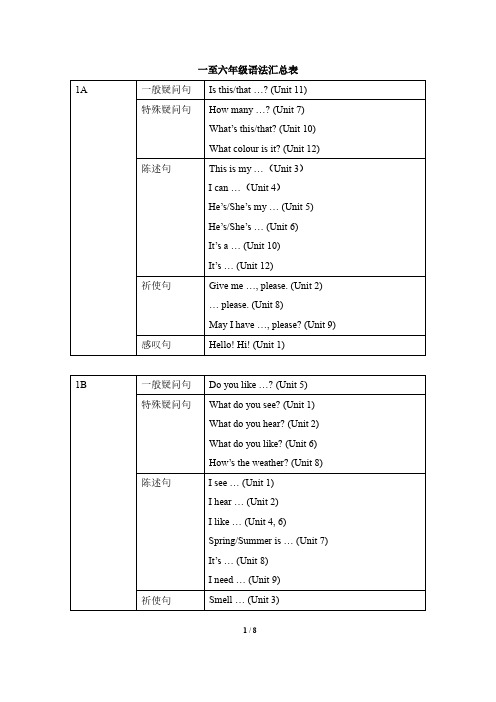
特殊疑问句
What does your mother do? She’s a nurse. (Unit 6) What would you like? I’d like some tomatoes. (Unit 8) Where is it? It’s on the table. (Unit 9) How many squares are there? There are two squares. (Unit 11) How’s the weather? It’s warm and sunny. (Unit 12)
3A
一般疑问句 特殊疑问句
Are you Kitty? Yes, I’m. (Unit 3) How are you? I’m fine. Thank you. (Unit 2) Who is he? He’s my father. (Unit 5) How much is it? (Unit 8) How much are they? (Unit 8) How many boys? Three boys. (Unit 10) What is it? It’s a rabbit. (Unit 11)
祈使句
Put … in / on … (Unit 8) Yes, please. (Unit 9) No, thanks. (Unit 9) Loot at … (Unit 11) Don’t … (Unit 12)
2B
一般疑问句
Is it …? (Unit 2) Can you hear …? (Unit 3) Do you like (doing) …? (Unit 4) Would you like some …? (Unit 5)
陈述句
- 1、下载文档前请自行甄别文档内容的完整性,平台不提供额外的编辑、内容补充、找答案等附加服务。
- 2、"仅部分预览"的文档,不可在线预览部分如存在完整性等问题,可反馈申请退款(可完整预览的文档不适用该条件!)。
- 3、如文档侵犯您的权益,请联系客服反馈,我们会尽快为您处理(人工客服工作时间:9:00-18:30)。
I the present tense 1 表示客观事实或普通真理.(不受时态限制) The geography teacher told us the earth moves around the sun. 地理老师告诉我们地球绕着太阳转。 Japan lies to the east of China. 日本位于中国的东方。 The sun rises in the east and sets in the west. 太阳东升西落。
――_____ David and Vicky _____ married?
――For about three years. (NMET 2003年北京) A How long were; being B How long have; got C How long have; been D How long did; get
3 表示主语的特征、性格、能力等。 Mr. Smith hates fish and never eats any. 斯密斯先生讨厌鱼而且从来不吃。 Mary speaks both English and French very well. 玛丽英语和法语都说的很好。
4
表示安排或计划好的肯定会出现的动 作或状态。 The plane takes off at 10:00 a.m. 飞机上午10点起飞。 Tomorrow is Wednesday. 明天是星期三。
Unit one
Grammar and usage
更多资源
I.
The present tense II. Present continuous tense III. The present perfect tense IV. The present perfect continuous tense
2 表示现在经常或反复发生的动作或存在的 状态,常和often, always, usually, sometimes, everyday, once a week 等表 示频率的时间状语连用. He takes a walk after supper every day. 他每天晚饭后散步。 My mother works at the same company as my father. 我母亲和父亲在同一家公司工作。 We always care for each other and help each other. 我们总是相互关心相互帮助。
In such dry weather, the flowers will have to be watered if they _______. (2001年上海) A have survive B are to survive C would survive D will survive
(NMET 2003年)All morning as she waited for the medical report from the doctor, her nervousness_______. A has grown B is growing C grew D had grown
2
表示动作发生在过去,但对现在仍留 下某种后果和影响。 He has paid his income tax. 他已经交了个人所得税。 Doctors have found that people who laugh a lot live longer! 医生们已经发现经常大笑的人长寿。
3
表示动作发生在过去但持续到现在。 My mother has been ill for three days. 我妈妈已经生病3天。 Most of us have studied English for 5 years. 我们大部分人已经学了5年英语了。
The water is boiling.
The sun is rising. The man is walking.
2 表示现阶段一直在进行的动作。 Jane is studying law while her sister is doing physics. 简在学习法律而她的姐姐在学习物理。 He is teaching English and learning Chinese. 他正在一边教英语一边学中文。
Notes: 以下四类动词不宜用现在进行时。 A 表示心理状态、情感的动词 Like, love, hate, care, remember, believe, want, mind, wish, agree, mean, need B 表示存在状态的动词 appear, exist, lie, remain, seem, belong to, depend on C 表示瞬间动作的动词 allow, accept, permit, promise, admit, complete D 表示感官的动词 see, hear, notice, smell, sound, taste, look
is coming 3 My family ________ to watch my show.
am 4 I ____ nervous about the show.
高考链接
Although he has lived with us for years, he ______ us much impression. A hadn’t left B didn’t leave C doesn’t leave D hasn’t left
4 与always often 等频度副词连用表示经常 反复的行为或某种感情色彩。 The girl is always talking loud in public. 那个女孩总爱当众大声喧哗。 She is often borrowing money and forgetting to pay me back. 她经常借钱却忘记还。 She is constantly complaining about her fate. 她不停地抱怨自己的命运不好。
(NMET 2002年春季北京) John and I _______ friends for eight years. We first got to know each other at a Christmas party. But we ______ each other a couple of times before that. A had been; have seen B have been; have seen C had been; had seen D have been; had seen
Notes:
注意区分一般过去时与现在完成时 时间上有差异:凡有具体的过去时间, 均用过去时态,不能用完成上,如: ago, last year, just now, the other day 等。 结果上有差异:现在完成时强调的是对 “现在”的影响和结果,动作到现在刚 完成或还在继续;一般过去时强调的动 作发生在过去,和现在没有关系。
am performing 1. I ______________ at the comedy Club tonight.
have been practising 2 I _________________ my jokes in front o the mirror for the last three hours.
5 在时间、条件状语从句中用一般现在时表 示将来的动作。 We will have to put off the sports meeting if it rains tomorrow. 如果明天下雨我们将不得不推迟会议。 I can’t leave unless my boss agrees. 除非老板同意,否则我不能走。 Notes: if 引导的条件状语从句中可以用shall 或will 表示意愿,但不表示时态。 If you will accept my invitation and come to our party, my family will be pleased.
3 表示按计划近期内即将发生的动作。 I am meeting Mr. Wang tonight. 我今晚要去见王先生。 I am going to Qingdao for the summer holiday this year. 我计划今年去青岛过暑假。 The plane is leaving for London soon. 飞机即将飞往伦敦。
IV. the present perfect continuous tense 表示从过去某一时间开始一直延续到现在的动作, 这个动作可能刚刚结束,也可能还要继续下去。 Chinese have been making paper for more than 2000 years. 中国造纸的历史已有2000多年了。 Doctors have been researching that question for many years. 多年来,医生们一直在研究这个问题。 The children have bee watching TV all morning. 孩子们一上午一直在看电视。
III. The present perfect tense 1 表示反复发生的经历 He has hosted the show eight times. 他已经连续八次主持表演。 Billy Crystal has been in many films and television shows. 贝利克克里斯托已经出演过多部电影和 电视剧。 We have been to the Great Wall many times. 我们已去过长城多次。
Notes:
在时间或条件状语从句中,现在 完成时可以代替一般将来时。 If you have done the experiment, you’ll understand the theory better. 如果你做完试验,你会更好地理解这个 理论的。 Don’t get off the bus until it has stopped. 车停稳之前,别忙着下车。
